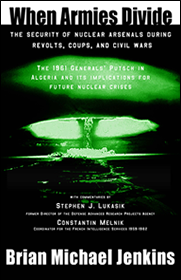When Armies Divide: The Security of Nuclear Arsenals During Revolts, Coups, and Civil Wars
[Brian Jenkins’ book, “When Armies Divide,” speaks to a central nuclear issue: what happens when society’s most organized response capability fades into a fog of uncertainty over who is in charge of what. How do the decisionmakers decide where the soundest leadership is as the rapid and inexorable march of time systematically takes options off the table?
The nuclear crisis examined here has been repeated in various contexts many times over. A tribute to the human spirit, or perhaps simply hubris, is the belief that crises are subject to “management.” We believe that attaching a word that means “prudent action” takes care of something that, by its nature, occurs despite the exercise of prior prudent designs.]
– Stephen J. Lukasik
Former Director of the Defense Advanced Research Projects Agency
 Excerpt from When Armies Divide:
Excerpt from When Armies Divide:
The possibility that rebellious military commanders might seize control of nuclear weapons and use them to threaten loyal forces, blackmail the government, or deliberately provoke an international crisis has fascinated novelists and worried governments for decades. The consequences of such events are usually examined in simulations based on hypothetical scenarios. In the inquiry presented here, however, we examine a real-life case.
In 1961, France was testing nuclear weapons in the Sahara. The first three tests, code-named Gerboise Bleu, Blanche, and Rouge, went well. The final preparations for the fourth test, Gerboise Verte, coincided with a rebellion by commanders of the French Army in Algeria. The leader of the revolt believed that the nuclear device being tested might be useful to the rebels and sought to delay the test. The government was determined to proceed.
Taking this as our starting point, we explore the potential consequences of such an event, especially if it were to occur in today’s political environment. It is a fascinating, if sobering, topic.
The test did take place, although with disappointing results. Some blamed the desert heat, which affected the delicate instruments, while others claimed that the explosion was a hastily arranged fizzle intended to ensure that the device would not fall into rebel hands. This inquiry raises broader questions about how non-state actors might acquire nuclear weapons and the strategies aimed at preventing them from doing so.
Download and read the full ebook here.